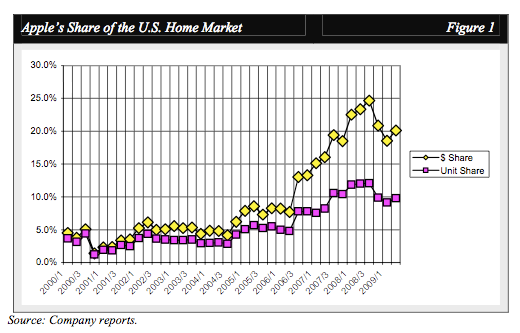Microsoft's fight against Apple ads seen as waste of money
In Sunday's New York Times, Devin Leonard took a look at the advertising battle between Apple's "Get a Mac" campaign and Microsoft's "Laptop Hunters" and "I'm a PC" TV spots. He said that the ad war between the two companies is "destined to go down in history," with the likes of the Pepsi-Coca Cola rivalry of the '80s and '90s. But in a new note to investors, Charlie Wolf of Needham & Company said the Mac's recent market share gains are a result of much more than advertising. In addition, he said the Windows maker would be better suited using its money to combat overseas piracy in emerging countries.
"One has to admit that Apple’s 'Get a Mac' campaign was humorous if nothing else," Wolf said. "But why Microsoft responded with an ad campaign of its own is a mystery. The company erroneously attributed the Mac’s share gains to the 'Get a Mac' campaign... However, the damage done to Windows' worldwide market share was miniscule. While it’s true that the Mac’s market share has more than doubled in the past five years, Windows’ market share loss was just 2-plus percentage points."
He said that Windows' share of the worldwide PC market is only 70 percent, and that's mostly due to piracy of Microsoft's operating system. Chasing those pirates, Wolf said, would be a better value for shareholders of Apple's rival to the north.
Apple's own market gains with the Mac platform are attributed by Wolf to the iPod "halo effect," in which users become more familiar with Apple products and migrate to the Mac. In addition, he said constant updates to OS X as well as the company's consumer-friendly Apple retail stores have all given the Mac more market and mind share.
"Those share gains began long before Apple introduced its 'Get a Mac' campaign," Wolf said. Apple's share of the U.S. home market, which is the focus of its ad campaign, has already increased from a low 2.9 percent in the second quarter of 200r to 7.8 percent by the time the 'Get a Mac' campaign began, and it eventually rose as high as 12.1 percent in the second quarter of 2008."
In a separate report last week, Wolf went in-depth into the breakdown of recent PC and Mac sales, as Apple saw a 5.5 percent year-over-year increase in sales. He believes those gains were achieved through price cuts in the MacBook Pro lineup enacted on June 8, and that the Cupertino, Calif., company was able to make those cuts without affecting its bottom line due to high profit margins on the iPhone.
In the second quarter of 2009, Apple commanded 8.7 percent of the U.S. PC market, growing from 7.4 percent in the first frame of the year. That as the rest of the PC market slid 1.2 percent year over year.
Contrasting the styles of Apple and its rival, Wolf calls Microsoft's ads "a variation of cash for clunkers," focusing on price and emphasizing that more things are important than just brand.
"What's implied, at least from Microsoft's perspective, is that the only reason the Mac gained share was its ad campaign that derided the Windows PC," he said.
 Neil Hughes
Neil Hughes











 Mike Wuerthele
Mike Wuerthele

 Malcolm Owen
Malcolm Owen
 Chip Loder
Chip Loder

 William Gallagher
William Gallagher
 Christine McKee
Christine McKee
 Michael Stroup
Michael Stroup







123 Comments
Which all goes to show Gates had more brains than Ballmer by never doing this. I suspect Ballmer just got mad. Perhaps is was the use of a fat guy as 'I'm a PC' was taken personally?
Seriously though, Apple are smart and know advertising is often used to reassure people after they purchase not just to persuade them to purchase. A new car buyer often takes home a brochure of the car he / she bought to read for example. Apple ads are feel good and funny and perhaps are aimed at switchers, post sale, as much as anything.
"Pirates of the Overseaing"
Yeah I know overseeing is spelled incorrectly but it is a play on the articles use of "piracy overseas" and the Johnny Depp movie, "Pirates of the Caribbean"!
Anyway, leave the pirates alone, maybe their OS is better?!
That's what happened to me. I went through two HDD-based iPods, an iPod touch 1G, an iPod touch 2G, an iPhone 3GS, and I just recently bought a MacBook Pro and ditched my PC.
Microsoft's fight against Apple ads seen as waste of money... ...by apple fanatics like us.
"Pirates of the Overseaing"
Yeah I know overseeing is spelled incorrectly but it is a play on the articles use of "piracy overseas" and the Johnny Depp movie, "Pirates of the Caribbean"!
Thanks for explaining - but if your joke needs that much explaining perhaps it ain't worth telling. Still, I guess you laughed out loud.